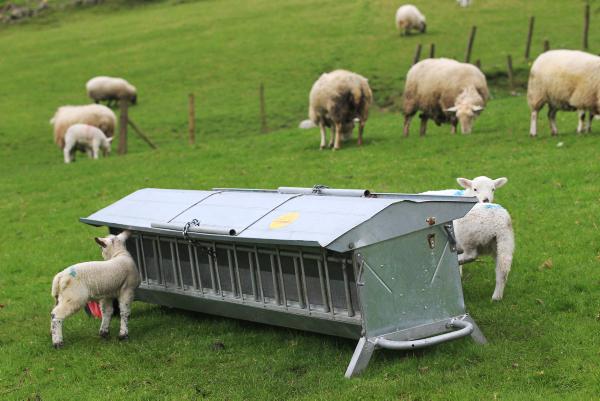Creep Feeding Lambs
19 March 2020Conditions haven’t been favourable as yet for grass growth, with many waterlogged and cold soils. To compensate for limited grazing, it is worth evaluating creep feeding of lambs this year.
When grass is short the ewes will have a reduced milk yield, to ensure the lambs continue to perform creep feeding can be introduced on an ad lib system. Young lambs have a very good feed conversion rate of 4:1 prior to weaning, this decreases to 12:1 as the lamb ages. Ewes reach their peak milk yield at 30-45 days post lambing, at which time the ewe is competing with her lamb(s) for grass, creep feeding can take some of this grazing pressure off and allow the ewe to regain condition. In addition the creep feeding will allow the lambs to continue to thrive and achieve good growth rates.
Creep feeding may be tailored to multiple bearing ewes who are struggling to produce enough milk for her lambs, this would supplement the lambs, aiding growth rates.
Creep feed is not as economical as grass, but in the situation of grass shortages, it can ease the pressure while ensuring good growth rates to sell lambs, allowing stocking densities to reduce for mid-season grazing.
Some creep feeding tips:
- Introduce creep early for high conversion rates (4:1 reducing to 12:1)
- Younger lambs are more inquisitive and more likely to investigate the feeder
- The best response is when grass is below 4cm height
- Ensure there is sufficient feeding space
- Easy entrance for lambs, not allowing the ewes to gain access
- Site in an area passed often by the flock, to encourage lambs to go in to the feeder
- Fresh, clean, palatable feed
- Sheltered area
- Move the feeder frequently to reduce feet problems, orf, cocci, etc.
- Use builders lime in the creep area to prevent scald, etc.
- Feed should be mineralised to help prevent urinary calculi
Please ensure you order inputs such as creep feed in plenty of advance, to help your feed supplier plan when there may be staff shortages due to COVID19.
Kirsten Williams, kirsten.williams@sac.co.uk
Sign up to the FAS newsletter
Receive updates on news, events and publications from Scotland’s Farm Advisory Service

